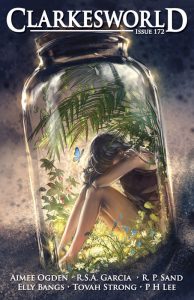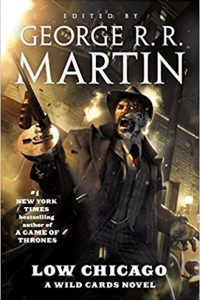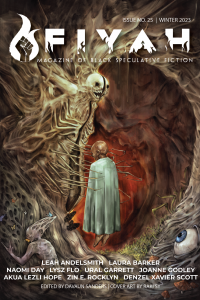Karen Burnham Reviews Short Fiction: Clarkesworld, Lightspeed, Strange Horizons, Tor.com, and Mysterion
 Clarkesworld 1/21
Clarkesworld 1/21
Lightspeed 1/21
Strange Horizons 1/21
Tor.com 1/6/21, 1/19/21
Mysterion 1-2/21
January’s Clarkesworld kicks off with “Intentionalities” by Aimee Ogden, where in the near future Sorrel gets trapped in an all-too-plausible system of debt peonage and ends up “conferring” a child to Braxos Corp. She bears the child, Abigail, and is able to raise her to the age of five with resources from the corporation, then has to surrender her, as she’ll eventually become a space miner. The rest of the story is Sorrel’s work with non-profits that have the goal of dismantling this system of debt-based slavery. It’s a very short story in which to sketch out a complex system and a whole life, and sometimes it feels a bit rushed, but its point is well drawn. In “Deep Music” Elly Bangs brings us the story of Quinn, a very well-dressed queer woman who isn’t over her recent breakup, and the Aquid beings that she rescues and cares for. When a competitor sets up as an exterminator rather than a shelter, she has to go to bat for some beings that she feels just on the verge of communicating with…. Will she realize what they’re trying to tell her in time? Will she be able to hear them over the din of the antagonist and also her well-meaning ex?
Stories by R.S.A. Garcia and R.P. Sand both feature soldiers, although from very different angles. In Garcia’s “Philia, Eros, Storge, Agápe, Pragma” Eva survives a crash landing and is separated from her Sister AI, but rescued by Dee, a man with whom she has instant chemistry. In a rather disjointed way, we jump around in her history and put together her role, what she’s done in the past (sometimes terrible), something of Dee’s past (also painful), and what Eva might be able to accomplish moving forward. This is a story where the feelings and the relationships trump the plot many times over. In Sand’s “The Last Civilian” Zeta73 is decanted as a fully formed soldier and barely survives their first battle; later they meet a member of a later generation of soldiers that seems to have a different role laid out for them. Eventually a larger picture begins to emerge of why their society is so constrained, and there’s a satisfying reveal of the larger context. Sand plays a neat trick with the POV of the narration.
Lightspeed kicks off its year with an interesting science fictional scenario in “The Incorruptible World” by Anjali Sachdeva: In a universe where the super-rich can terraform their own planets made-to-order, what happens when a germophobe gentleman orders a planet that is as sterile as possible while still supporting life? Then what happens when a short honeymoon stay turns into a multi-year survival scenario for him and his new bride? I’m skeptical about the ecosystem, but the story itself is engaging and poses some interesting questions. In a very different take on the theme of being marooned, “The Memory Plague” by D. Thomas Minton puts us in the heads of an alien species that preys on sentient life. As the latest generation of the vorta are born (in a very specific sequence with exact roles to play) we slowly tease out the mystery of where they are and what the future might hold for them. In the fantasy section, PH Lee brings us another entry in their sequence of fairy tales with “Frost’s Boy“. A stunningly beautiful child was abandoned in Winter, but Frost couldn’t bring himself to kill the boy and adopts him instead. Lacking any sort of human love as he grows, he turns into a cold and cruel monster, luring pretty young women to him only to freeze their hearts to death with a kiss. In true fairytale fashion, one young maid brings him home to her parents, and it will take their combined wits to save her from suffering the same fate. Lee adds a particularly fascinating denouement that undermines what we might wish “happily ever after” to be for the maid.
Strange Horizons starts the year with a strongly multicultural trio. “Yearning” by Maya Beck imagines a group of sharecroppers just after the Civil War. Shadow has learned “yearning” or “firesailing,” a ritual where a group of people gather and let their spirits soar to the future, guided by the leader, which is an interesting exercise on its own. They see a world where the plantation house becomes a museum that features a history of slavery, although they’re most interested in what happens to their own descendants. That would be a satisfying story as-is, but it gains another layer when the ex-slaveholder’s son comes down and demands that Shadow complete the same ritual with him. What future to guide him to? My only complaint with this story is that I would have loved to read more denouement. “The karyōbinga sings to Jiro” by Ryu Ando is a lovely short tale of a widower deep in grief and the mystical bird who comes to him. “The Secrets of Kath” by Fatima Taqvi is a much more unsettling tale set in India and narrated by a rich man’s wife to his son; she is trapped in some ways by the father’s need to display his wealth and status at every turn, including on her. When a traveling puppeteer (putiwallah) comes to the village and puts on a show, she’s mostly paying attention to the subtle social cues of all the people around her, until the puppet show takes a dark turn that hits close to home. How close is the relationship between the puppets and those they depict?
The first two stories in Tor.com for the year are both hopeful, as befits anything following in the wake of 2020. “Let All The Children Boogie” by Sam J. Miller is set in 1991 as Laurie bonds with nonbinary Fell over the music of Iggy Pop and David Bowie. They are also fascinated by the stray transmissions that seem to interrupt their favorite late night DJ, and the mystery helps deepen their relationship. Then in “#Selfcare” by Annalee Newitz Edwina is making a decent living as the receptionist of a branch of a trendy Skin Seraph store where Daisy is an up-and-coming influencer. Their worlds get turned upside down when a supernatural figure starts messing up the place and publicly horrifying clients, leading to humiliation on social media. Their reaction to this sequence of events turns in a you-go-girl empowering kind of direction.
My favorite story in the Jan/Feb issue of Mysterion is “Devil Dog” by Len Bailey. Set in the South in WWII, Corky Sue is grief-stricken over her ailing dog when she sees a handsome local soldier boy, Lawton, coming home. With all the charming dialog of a historical Southern tale, he helps her out with her dog and then heads for his house. So Corky Sue is stunned when she’s invited to his memorial service because he died in the war. It’s one of the sweetest ghost stories I’ve read recently. There’s a conspiracy at work in “Do You Hear the Angels Sing” by H. L. Fullerton, where people who heard a literally angelic band at a local gas station have been dying mysteriously, including Wills’s husband Waylon. There’s a lot of grief and stress packed into this tight short story. A different kind of tension permeates “Salvation” by John Nadas, as a man comes to pick up his daughter from his ex’s place. His ex’s new partner is part of a particular church that uses neurostimulation as part of its conversion work, something the man finds deeply suspicious. This opens up some interesting questions about the meaning of spirituality, consent, and the interaction between faith and technology.
Recommended Stories
“Devil Dog”, Len Bailey (Mysterion 1-2/21)
“Deep Music”, Elly Bangs (Clarkesworld 1/21)
“Yearning”, Maya Beck (Strange Horizons 1/4/21)
“Frost’s Boy”, PH Lee (Lightspeed 1/21)
Karen Burnham is an electromagnetics engineer by way of vocation, and a book reviewer/critic by way of avocation. She has worked on NASA projects including the Dream Chaser spacecraft and currently works in the automotive industry in Michigan. She has reviewed for venues such as Locus Magazine, NYRSF, Strange Horizons, SFSignal.com, and Cascadia Subduction Zone. She has produced podcasts for Locusmag.com and SFSignal.com, especially SF Crossing the Gulf with Karen Lord. Her book on Greg Egan came out from University of Illinois Press in 2014, and she has twice been nominated in the Best Non-Fiction category of the British SF Awards.
This review and more like it in the March 2021 issue of Locus.
 While you are here, please take a moment to support Locus with a one-time or recurring donation. We rely on reader donations to keep the magazine and site going, and would like to keep the site paywall free, but WE NEED YOUR FINANCIAL SUPPORT to continue quality coverage of the science fiction and fantasy field.
While you are here, please take a moment to support Locus with a one-time or recurring donation. We rely on reader donations to keep the magazine and site going, and would like to keep the site paywall free, but WE NEED YOUR FINANCIAL SUPPORT to continue quality coverage of the science fiction and fantasy field.
©Locus Magazine. Copyrighted material may not be republished without permission of LSFF.







